Ed.D. Key Features
Overview
This program is designed as a cohort experience with students beginning the program every other year. Because of the intensive cohort nature of this program, it is highly unlikely that graduate credits beyond the master’s degree will count toward this doctoral degree. Online courses are typically sixteen weeks in length. Courses will be scheduled so students can complete the program in a timely way, with standard time to completion being four years. In addition, there are three week-long summer institutes at which attendance is mandatory. The first institute is virtual and the second two are in-person at UF (always during UF summer break week).
Qualifying exams are required for each student to advance to doctoral candidacy. The written portion of the exam has three components: 1) a brief biographical statement, 2) a shift in thinking essay, and 3) a proposal for the capstone project. The oral component of the exam includes a presentation of one’s work as a practitioner scholar completed during the program, as well as questions posed about the written portion of the exam.
Each student will culminate their capstone experience with a dissertation defense occurring in a public forum. Students will demonstrate conceptual and practical competence and a critical stance in three core areas of expertise.
Core areas of expertise:
Theoretical
thoughtfully apply historical and theoretical constructs to today’s most pressing problems of practice
Pedagogical
skillfully enact research-based and equity-oriented practices in the areas of curriculum and instruction
Research
intentionally and systematically consume and conduct research about contextualized problems of practice
Key Features
Each key feature of the online EdD program in Curriculum & Instruction specializing in TSS corresponds to one or more of the Carnegie recommendations for effective professional practice doctoral programs
- A clear focus on the scholarship of teaching
- The identification of a “signature pedagogy” to guide the work
- Grounding students’ work in their own educational contexts to create authentic “laboratories of practice”
- Dissertation experiences in which doctoral students study local problems of practice to make change and improvements in their own local contexts (districts, schools, classrooms)
Teaching and learning philosophy
The TSS program faculty members define signature pedagogy as the salient pervasive teaching practices within this program. Assumptions about teaching and learning that undergrid the TSS pedagogy are:
- Learning is a recursive, long-term, collaborative and social process that happens within Communities of Practice. These are “groups of people who share a concern or passion for something they do and learn to do it better as they interact regularly (Wenger, 2006, from http://ewenter.com/theory/index.htm). Students will join communities of practice such as online communities, inquiry groups, and summer seminars.
- Learning is driven by inquiry.
- Teaching is a complex endeavor that requires the development and application of conceptual and practical tools.
- Effective teaching and learning is highly context dependent.
- Developing the capacity to address the most pressing problems of practice today requires a commitment to equity for all children.




